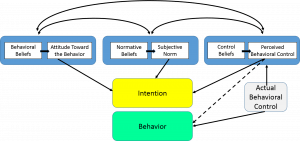Theory of Planned Behaviour
The Theory of Planned Behaviour is used to predict an individual’s intention to engage in a behaviour at a specific time and place.
Explaining food wasting behaviour using the theory of planned behaviour.
In this case, the attitudes, subjective norms and perceived behavioural control of Singaporeans towards wasting food will be the determinants for their intention to waste food.
Attitudes in Singapore towards food waste.
90% of Singaporeans are concerned about food waste generated from F&B outlets. However, 80% of Singaporeans when shopping for personal needs, will not buy or eat aesthetically unpleasant produce, despite 65% of those who will not eat ‘ugly’ produce being aware such choices contribute to food wastage. There is a gap in attitude here between the opinions towards food waste generated by different sectors, which probably has to do with salience. 95% of consumers want to know what Singapore’s F&B outlets are doing to reduce the amount of food waste generated. This is of no direct salience to the people, nor does not require any effort in-person taken. Consumers’ behavioural beliefs towards food waste is such that they know it is bad, want to reduce it, but don’t want to do so themselves. This leads to a knowing without action attitude towards the issue of food waste.
Subjective norms in Singapore, regarding food waste.
This point examines how important to an individual are the opinions close to the individual are. This translated into normative beliefs, which is what the individual think those closet to him would want him to think it’s right. What normtive beliefs the indiviual holds turns into subjective norms, which is the perceived social pressure from others for an individual to behave in a certain manner to comply with the views of those important to them. With a prevailing collectivist culture, and being a politically correct and kiasu (fear of lagging behind) bunch, subjective norms are of high importance to individuals here.
This strong influence of subjective norms might explain the high level of awareness amongst Singaporeans, yet low level of action towards reducing food waste. We know that those around us in general want us to feel that wasting food is bad, so we comply. However there are still many flawed opinions here about the purchase, handling and consumption of food, which result in food waste. Exactly because we value the opinions of those important to us, it will be difficult to break the norm to kick-start good practices. In holding such values, there is high extrinsic motivation and little true understanding of value and intrinsic motivation within us.
Perceived behavioural control.
Perceived behavioural control is how difficult one perceives to enact a behaviour, and the source is the control beliefs of each individual. In this case, if wasting food is perceived to be easier than it is to not waste it, consumers will choose to waste food instead. Some of the reasons why wasting food is so easy can also come from the rationalisations of one’s behaviour in the self-justification effect. In Singapore, city life is fast-paced, and remembering to bring things out such as a reuasble food container to pack leftovers can easily slip our minds. Being a pragmatic lot, the extra weight of an empty food box and having to wash it later will seem undesirable to many. Being humans, it is also difficult to resist the temptation of over-purchasing foods, with all the tantalizing F&B advertisements, only to realise afterward that it is impossible to finish all the food you ordered. Lastly, lack of sufficient knowledge or saliency of where to start from can result in lowered perceived behaviour control.
